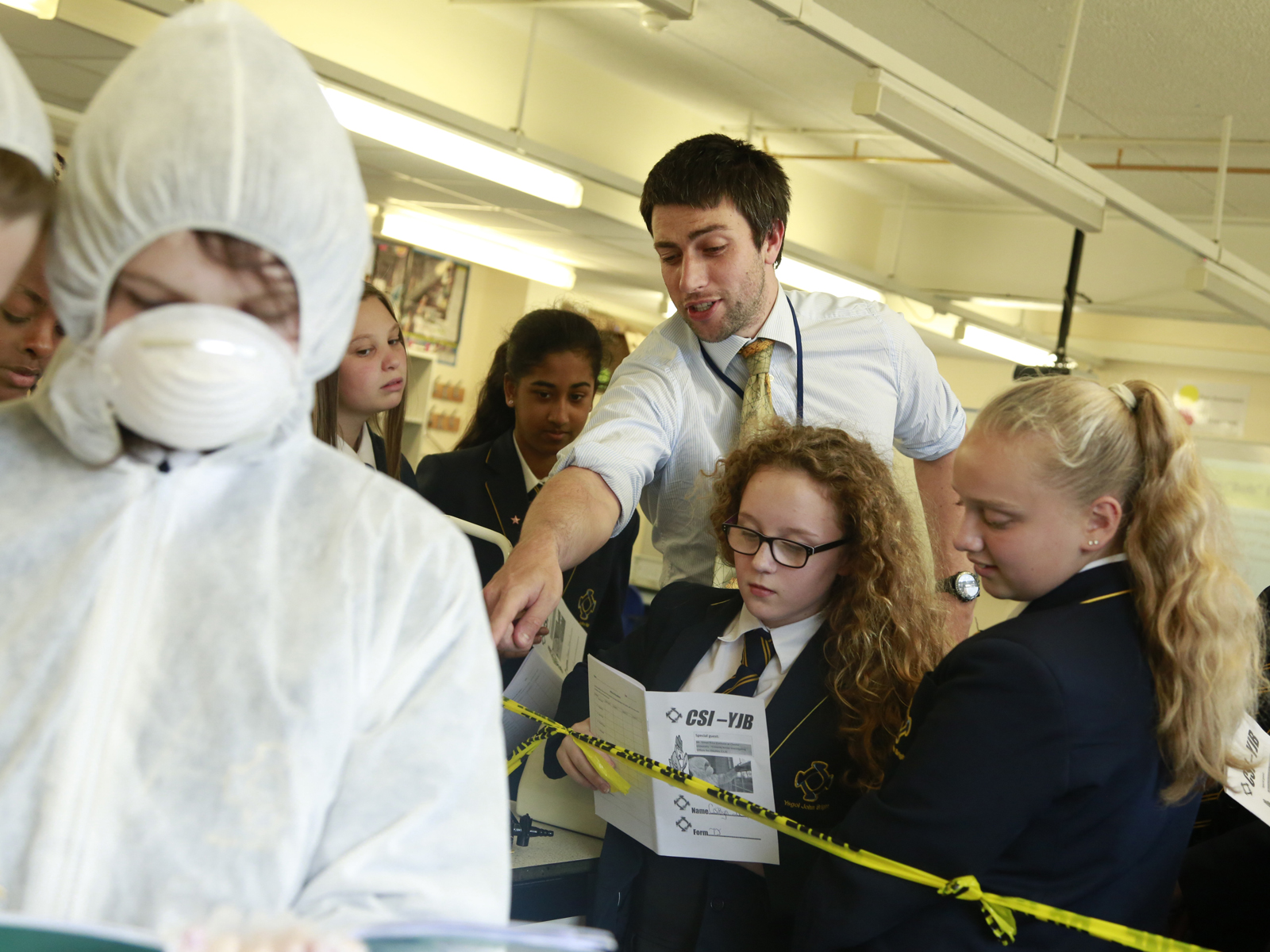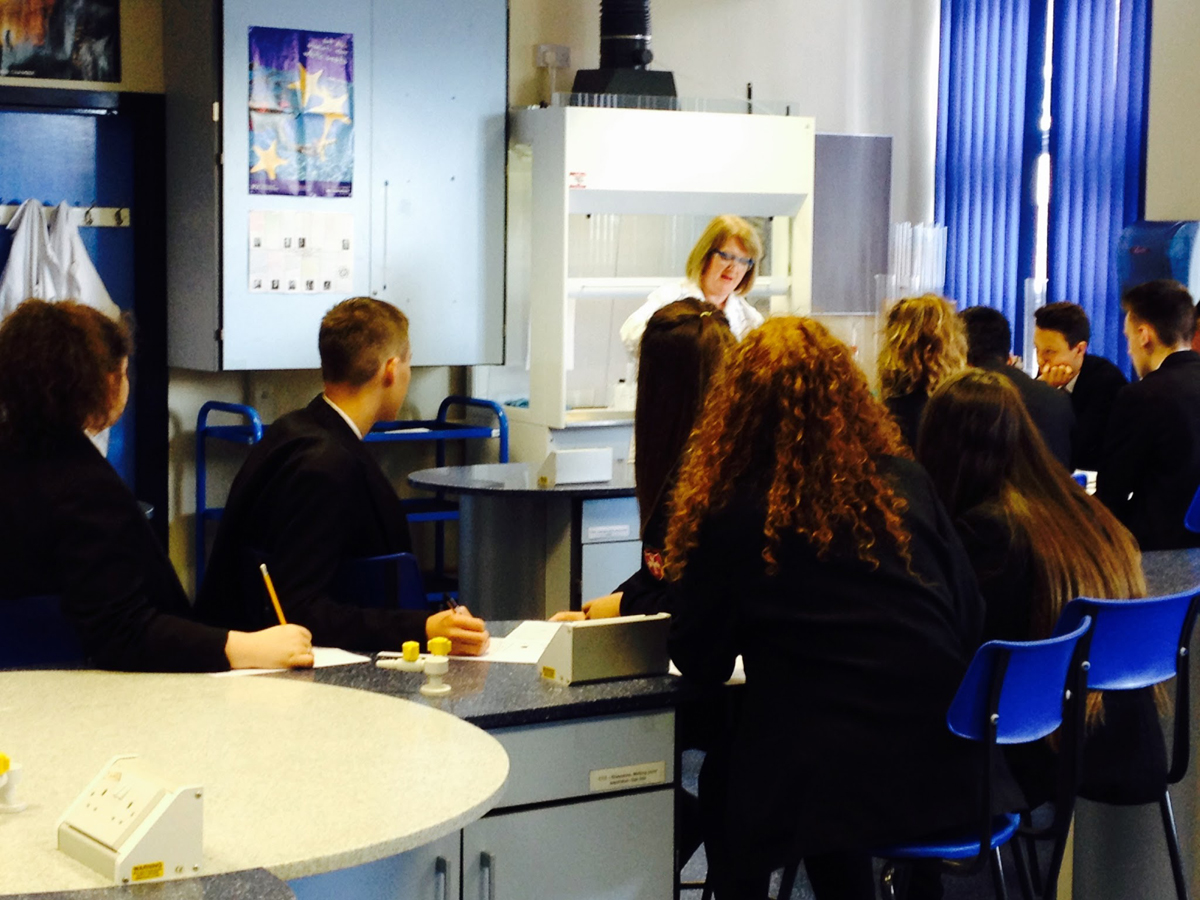Get into teaching
We chat to four teachers about their experiences in the classroom and also hear from some of our teacher training scholars on why more scientists should consider a career in teaching.

Picture: © James Pethica
James Pethica
Chemistry/science teacher at ysgol Branas Isaf, Corwen, Wales
James graduated from the University of Auckland with a BSc in chemistry, and initially took a position in the food technology industry. After a year, he decided that industry was not the path for him, and decided to train to teach, studying for a PGCE at Bangor University in 2015.
What are some of the challenges you’ve faced in your career so far?
The most challenging time for me was the PGCE year. The PGCE puts trainee teachers in an awkward position, in that they are asked to act as students and teachers simultaneously.
They are expected to plan each lesson in extremely fine detail, yet sometimes our mentors cannot provide an example of what this looks like, because they themselves rarely plan to that level of detail. What got me through this period was the support from the university mentor and landing a very supportive placement.
Read moreWhat do you love most about it and what keeps you motivated?
This year I received a handmade card from a student that said, “Before this year I have despised every chemistry lesson...I knew I was going to fail at GCSE. You have completely proved me wrong; I now love chemistry, as I understand it! I look forward to your lessons all day on a Wednesday (it’s the only thing keeping me going through double maths and English).” Knowing I have made a difference is what keeps me going and gets me out of bed in the morning.
Where do you go to get support with your day-to-day work and any challenges?
My school colleagues have been excellent for this. The Royal Society of Chemistry experiment books are always useful. Institute of Physics and Royal Society of Chemistry contacts also have great ideas.
How important do you think Royal Society of Chemistry membership is for chemistry/science teachers?
The support provided by the Royal Society of Chemistry including discounts on books and support for things like the science club I set up are invaluable. The Royal Society of Chemistry has come in twice to present to the students and also runs competitions and study sessions that I have used.
"I might have underestimated the challenges that I’d face but it’s been really rewarding. I’ve learnt more about myself as well. I’ve become more confident in myself. I think I underestimated how much it would help me."
Anish, teacher training scholar 2017, speaking about his PGCE year

Hazel at the Association for Science Education conference in Dundee, March 2017 Picture: © Hazel McGhie
Hazel McGhie
Teacher at Gavinburn Primary School, West Dunbartonshire, Scotland
Hazel’s interest in science was initially sparked by conversations with her parents. After graduating from the University of Strathclyde with a B.Ed in primary education, Hazel was posted to Gavinburn Primary School and is now in her 7th year of teaching there.
Why did you decide to train to be a teacher?
In my own primary education, STEM subjects were never taught in any great depth or given much importance. In this age of jobs becoming more and more focused on STEM subjects, I wanted to fuel an interest in science in young children, to show them the opportunities it creates; just the way my parents had done for me.
What are some of the challenges you’ve faced in your career so far?
It is a difficult task to keep so many, very important, plates spinning at once and ensure you are doing your absolute best for every child in your class.
I have also found that the perception of primary education, from people not involved in the area, is that the children are ‘too young’ to fully grasp sophisticated concepts. This frustrates me, as I find the young people I work with to have some of the most inquisitive, imaginative, logical and motivated minds I have ever encountered. I try to challenge this view by involving parents and sharing the children’s successes with the wider community, to highlight just how capable they are.
Read moreHow do you bring your particular love of science into the classroom, while not specifically being a science teacher?
I suppose I differ from my colleagues in the secondary sector in that they focus on science all day, every day. My science input is limited in the week as I have to teach the whole curriculum, but I love tying STEM into different areas of my teaching, to ensure children see the relevance of science and technology in real life contexts.
It was through developing a chemistry club for the upper school that I became involved with the Royal Society of Chemistry and Nicola Jordan [education coordinator for West and South West Scotland]. Without Nicola and my membership of the RSC, the club would have had nowhere near the impact it turned out to have.
What advice would you give someone thinking about training to be a chemistry/science teacher?
I am aware that many scientists would automatically choose secondary if they had an inclination towards teaching, but my suggestion would be to consider primary. We have a chance to, at this young age, open the doors to scientific discovery and possibilities. Be a part of giving young people opportunities to expand their knowledge, discover their interests and ignite passions that could last a lifetime!
“It’s always been something I wanted to do but when I left university I wanted to do a few different things. I had a job in London for a couple of years but I was just sat at my desk bored; every day was the same, nothing new happened and I just knew it was time to train to teach. I’ve really enjoyed it because every day is different, every class is different and every hour of every day is different.”
Helen, teacher training scholar 2017, through the non-salaried School Direct scheme
William Davey CChem MRSC
Chemistry teacher at King Edward VII School, Sheffield
Following his degree in chemistry, William worked for Merck Sharp and Dohme Neuroscience Research Centre, as a pharmaceutical research chemist. He had originally planned to go on to complete a PhD, but on speaking to family and friends, he decided to train to teach, studying for a PGCE at the University of Sheffield. He’s now been teaching for over 20 years.
When you were younger, what did you think you wanted to be when you grew up?
I wanted to be a firefighter up until the age of about 18. Deep down, I possibly still want to be one. But, at my age, I think that the ship has sailed on that ambition!
Read moreWhy did you decide to train to teach?
I decided that I needed more fulfilment than I was getting being a research chemist at Merck Sharpe and Dohme. King Edward VII School in Sheffield is a comprehensive school in the fullest sense of the word. Students of the school speak almost 60 languages between them and hale from every post code in Sheffield, which creates a very diverse atmosphere. I must like it because I’ve stayed here for over 21 years, holding positions as head of year and head of chemistry.
What do you love most about teaching and what keeps you motivated?
It sounds rather glib but the kick that one gets when the penny drops with a kid is great. I also have a suspicion that some teachers enjoy the thrill and adrenaline of being on stage. It can be terrifying, exhilarating and exhausting in equal measure. Personally, I like to try to deliver my chemistry through the medium of humour. When kids are happy, they become so receptive to learning facts and concepts. I want my students to not feel threatened or intimidated, even when the material is very challenging, and a bit of laughter really helps.
What advice would you give someone thinking about training to be a chemistry/science teacher?
Go for it! If you love chemistry and you like working with kids, it’s a great career. Sure, it’s tiring and at times, frustrating, but the many rewards outweigh this for most teachers. I would never advise anybody to go into it without serious consideration. A decent salary, job security and long holidays should not be high on the list of reasons to consider teaching as a career; these factors alone can’t sustain one through the tough times, which there will inevitably be.

Nora hosting a Chemistry at Work event in 2015 Picture: © Nora Richardson
Nora Richardson CSci CChem FRSC
Curriculum manager for Maths, Science and PE at Coleg Cambria, Wales
Nora always knew she wanted to be a teacher, following in the footsteps of her mother and several other family members, and has been teaching for over 25 years. She started teaching in secondary schools, but moved to focus on sixth form education and now works in in a large FE college.
What do you love most about teaching and what keeps you motivated?
Being part of students achieving and moving on to the next stage. We have just celebrated another excellent set of A Level and BTEC results and it was so rewarding to see so many students go to their first choice university or apprenticeship, or meet job offers.
Have there been any particular highlights/stand out moments?
I was very proud in 2005 that the Royal Society of Chemistry recognised my experience of working in science education and awarded me Fellow status.
Working in a dynamic college there have been so many opportunities. I have been able to run science projects for students with additional learning needs, partnering with primary and secondary schools. I also worked with the college’s international team on a visit to schools in China and recently did some voluntary teaching in Thailand.
Read moreHow important do you think Royal Society of Chemistry membership is for chemistry/science teachers?
I have been a member of the RSC since I was a university student and would encourage all aspiring chemistry students and teachers to join. I have used it as part of my professional development and attended management training, CV writing courses and industry tours. Last year I trained to be a mentor for members applying for MRSC status. I have been a presenter and demonstrator at several outreach events, at which I have enjoyed meeting subject colleagues and some very young chemists! The teaching resources are excellent and I often go to the website for inspiration. Our local education coordinator has visited college many times to give talks on opportunities in chemistry and support events.
What advice would you give someone thinking about training to be a chemistry/science teacher?
It is a rewarding and challenging role. Everyone needs help, especially at the start of their career, so always ask for it and admit where you are having difficulties. Don’t work in isolation – review resources that colleagues have produced and share yours; take the opportunity to watch how other teachers work when you can as there is always something you can pick up.
“It’s a very noble profession – it has always been and it still is. But I have to be honest, it’s hard work. It’s very challenging, but when you think of the rewards, when you think that you’re going to make a positive difference in the lives of people who are going to be our future, if you realise all this, go for it. It is doable, I have done it now, and you can do it as well!”
Blessing, teacher training scholar 2017